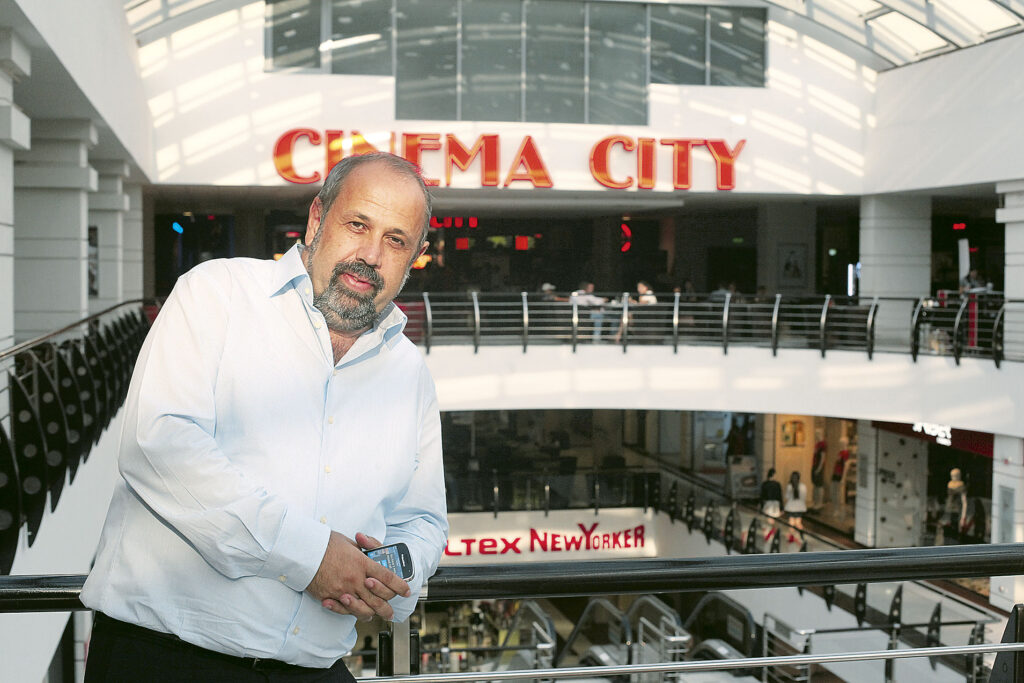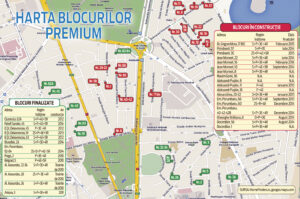In 2006, when he sold the shoe factory Cotidian Bacau (former Partizan) to the Italians at Kolan, Ovidiu Budeanu alloted 85% of the former industrial platform for the construction of Arena Mall. Six years later, in 2012, the commercial center is 100% filled, so the businessman is giving expansion a serious thought. He launched talks with French multinational retailer Carrefour to attract their involvement in the project and, at the same time, he started negotiating with the Italians to buy back the 17,000 sqm land where the factory operates.“Kolan has a shoe sole factory that’s doing well and they just won’t sell the land. Add to that the fact that we’re not quite ready yet to make an investment according to Carrefour standards and you’ll find out why we decided to just abandon that option. Recently though we reached an agreement with the Spanish real estate company Fadesa, that owns a 7-hectare piece of land to the left of the shopping mall”, said Ovidiu Budeanu in an interview exclusively for Capital.
Martinsa-Fadesa, who went bankrupt on the Spanish market in the summer of 2008, owns over 80 hectares in Romania – in Bucharest and Bacău. Ever since the crisis started the company announced that they intend to sell some of the land they own here. In Bacău, the Spanish had planned to construct some 2000 flat-residential buildings, but the project was delayed. Arena Mall negotiated repeatedly with people at Fadesa to buy a 13,000 sqm lot of the land they owned, but they claimed a price above what he was willing to offer. Now, the two parties have agreed on 100 euros/sqm, payable in installments. Budeanu is looking forward to signing the deal off and starting the further 5,000 sqm development of the mall in the course of next year. The cost of this development has been estimated by the owner at 3-4 million euros, out of which 1,3 million is the price of the land.
“The mall development will be done from the street up to the lake on the left hand side. My main goal is to change its shape. I might manage to move Billa to the new space, on a larger surface and with a different design. There are several other retailers who would like to get in, but there’s no available room anymore”, he explains.
Plans for the future
By 2020, the businessman intends to reimburse most of the 35 million euro credit he got for the expansion of the mall. In the seven years of activity, he managed to pay back 11 million euros, and he now owes Unicredit Ţiriac Bank 24 million euros. Arena Mall pays back 1.5 million euros to the bank every year, but the owner of the mall is not willing to pay it back too soon, because, as he explains, the deductible cost of the interest is helping. Moreover, over the past few years, the mall has been exempt from paying the profit tax because, while the company reports operational profits, it actually has financial losses, due to differences in exchange rates. Budeanu has reached 100% in rent collection and that is because he decreased the average rent to 10 euros/sqm/month, but for the next six years he wants to increase it progressively to 12 euros/sqm/month.
“What I’m aiming for is to have a good income, not a commercial profit first and foremost. The rent income reaches 470,000 euros per month, including VAT and management tax, and that goes up by 10,000 euros every year. Our goal is to obtain a base rent amounting for at least 300,000 euros by 2020, which implies increasing the rent from 10 to 12 euros/sqm/month, to be covered entirely by tenants. This arrangement does not influence the ongoing contracts, and it will only be possible through a new space redesign. Our debt will have dropped to 40% by that time”, mentions the owner of Arena Mall.
“If I found a reliable partner to sell 40% to (not 50%, it’s stupid to have equal shares), someone who would see Arena Mall as a good investment opportunity, we could certainly make good use a capital inflow. There are people with money available out there, but I haven’t tried to find them. Maybe in 3-4 years’ time this will become a priority, but for now I’ll settle for a family business”, he adds.
Turning down offers
A few months after the launching of Arena Mall, the Portuguese company Sonae Sierra, owning the River Plaza Mall in Râmnicu-Vâlcea, made him an offer. Budeanu says that the investors’offer was of 80 million euros and he has no regrets over turning them down, because at that time the company’s liabilities were significant, and after paying the income tax, the remaining amount would not have been enough. The businessman did not accept the South African offer (New Europe Property Investments-NEPI), who offered to take over 50% of the mall. Today, Budeanu assesses his shopping mall to 45 million euros and is determined to leave it to his three children.
“It is an interesting business and I like it. I’ve been doing only this for the past 7-8 years and if I sell out there is nothing else I am just as good at. I am now teaching my kids to take over the business“ , he says. Even if he attended some courses organized by the International Council of Shopping Centers, which taught him the basic principles of shopping malls, he claims that need was his best teacher. The crisis came as a blessing in disguise for Ovidiu Budeanu, as the investors who were interested in developing commercial centers in Bacău have given up on their plans and that helped Arena Mall to be fully occupied. Now he says that Bacău can no longer absorb another mall for the next 10 years. Being a large consumer of electricity, Arena Mall was also aided by the liberalization of the energy market, by a slight reduction of utility costs. The owner of the mall says that the new regulations gave him a hand in negotiating with E.ON.
INTERVIEW
Ovidiu Budeanu:” I am not interested in saving my money”
Capital: H&M opened up a store in Arena Mall in December 2012. Was there a significant traffic improvement?
Ovidiu Budeanu: Yes, a significant one, indeed. H&M is a very good anchor. The best move though was in 2010, when Zara opened a store. A mall without Zara and a cinema is not a mall, but rather an attempt to a mall. They were really like a magnet for other prestigious brands. We do not accept national or local brands. At least the base floor only displays top brands. The average traffic is of 7,000 visitors a day during the week and in weekends it goes up to 12,000.
Capital: How do you set up the level of rent?
O.B.: The indicator that I take a close look at every month is the effort rate of tenants, which means the total amount that has to be paid to the owner, out of the total sales. We do have some limitations according to the type of store. All tenants have a base rent, to which a percentage of sales is added, and that varies according to their capacities. We take into account whether they make profit or not. We realize Bacău is not quite Bucharest and that is why the average rent is of 10 euros/sqm/month.
Capital: Did any of your tenants move last year?
O.B. Deichmann and Leonardo were next to each other and they were eating out each other’s share so we gave up Leonardo and we brought MaxBet in their place. Now we’re modernizing our fitness room.
Capital: How is the sanitation business going? (Apa-canal and Servsal SA)
O.B. It’s an ongoing lawsuit. We are still fighting a battle with the head of ANRSC. When Romanian businesses are private, they all try to make it hard for them, but when you deal with a foreign company, they all applaud it. The fact that things are going well for us triggers envy. We had the Onesti Termoficarea and gave it to the Mayor’s office amicably and they managed to go bankrupt.
Capital:Do you own any other businesses as well?
O.B. We have some small businesses, we organize events at the Măgura Verde hotel, but my wife is in charge.
Capital: Is there any other investment that sounds tempting to you on the real estate market?
O.B.: I don’t have any cash available to invest. All the money goes into the mall. I am not interesting in saving money, but in investing it. I do believe in this business. I am the first to go to work, and the last to leave.




